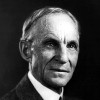“ Each man should have all he earns, whether by brain or body; and the director, the great industrial leader, is one of the greatest of earners, and should have a proportional reward; but no man should live on the earnings of another, and there should not be too gross inequality between service and reward. ”
Theodore Roosevelt, Theodore Roosevelt; an Autobiography (1913). copy citation
| Author | Theodore Roosevelt |
|---|---|
| Source | Theodore Roosevelt; an Autobiography |
| Topic | inequality reward |
| Date | 1913 |
| Language | English |
| Reference | |
| Note | |
| Weblink | http://www.gutenberg.org/files/3335/3335-h/3335-h.htm |
Context
“They fail to see that the Nation and the Government, within the range of fair play and a just administration of the law, must inevitably sympathize with the men who have nothing but their wages, with the men who are struggling for a decent life, as opposed to men, however honorable, who are merely fighting for larger profits and an autocratic control of big business. Each man should have all he earns, whether by brain or body; and the director, the great industrial leader, is one of the greatest of earners, and should have a proportional reward; but no man should live on the earnings of another, and there should not be too gross inequality between service and reward.
There are many men to-day, men of integrity and intelligence, who honestly believe that we must go back to the labor conditions of half a century ago. They are opposed to trade unions, root and branch.”
source


